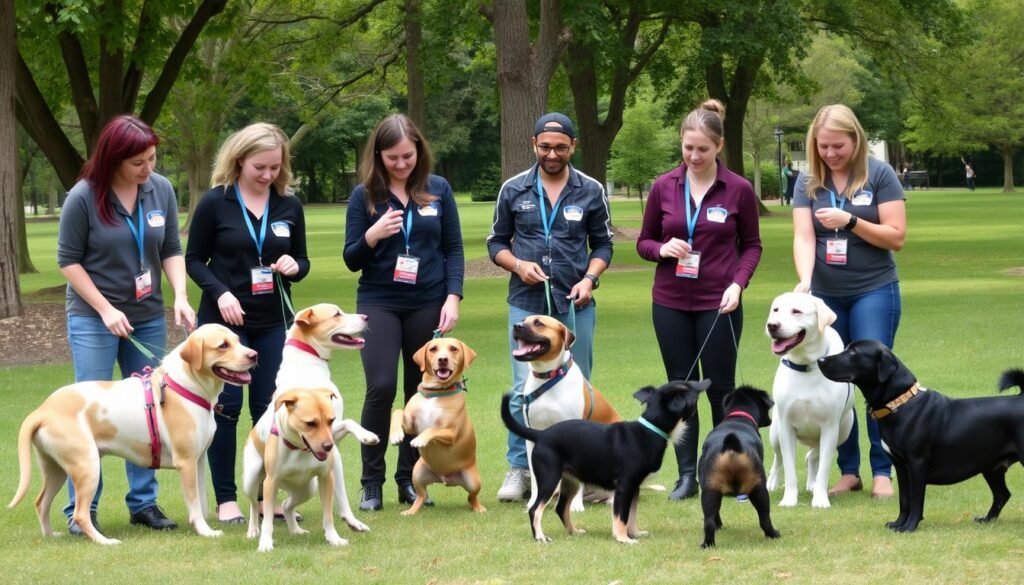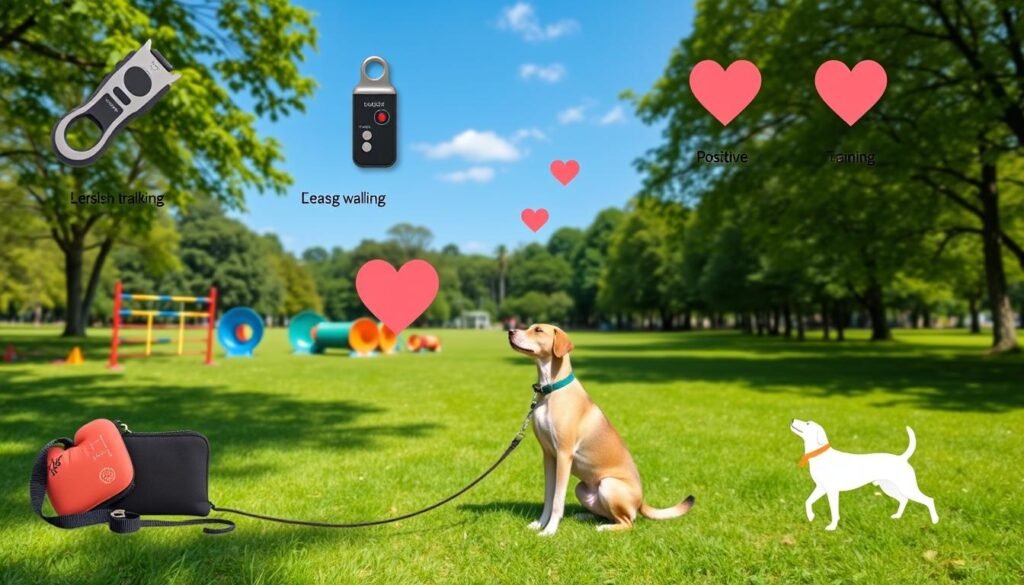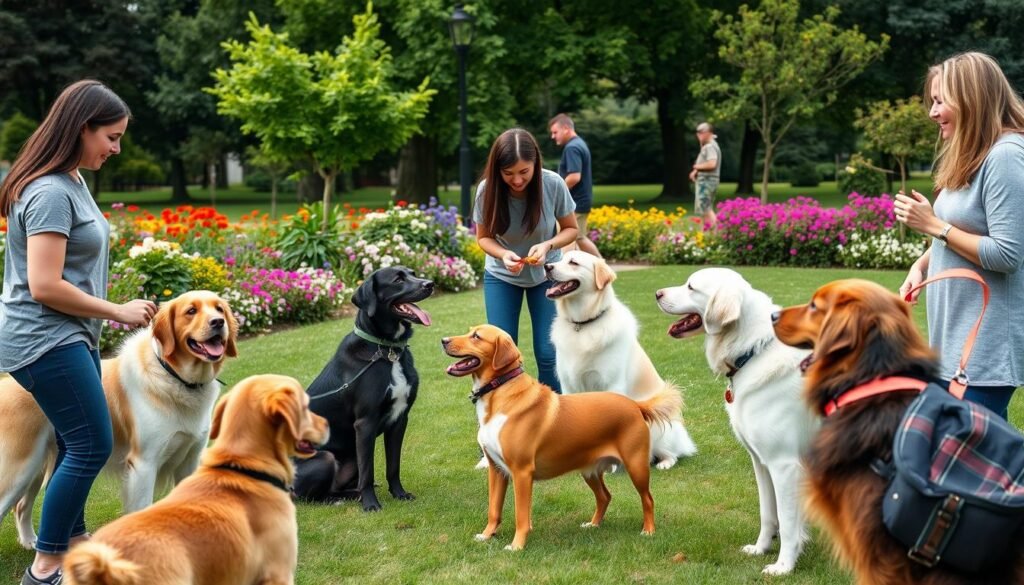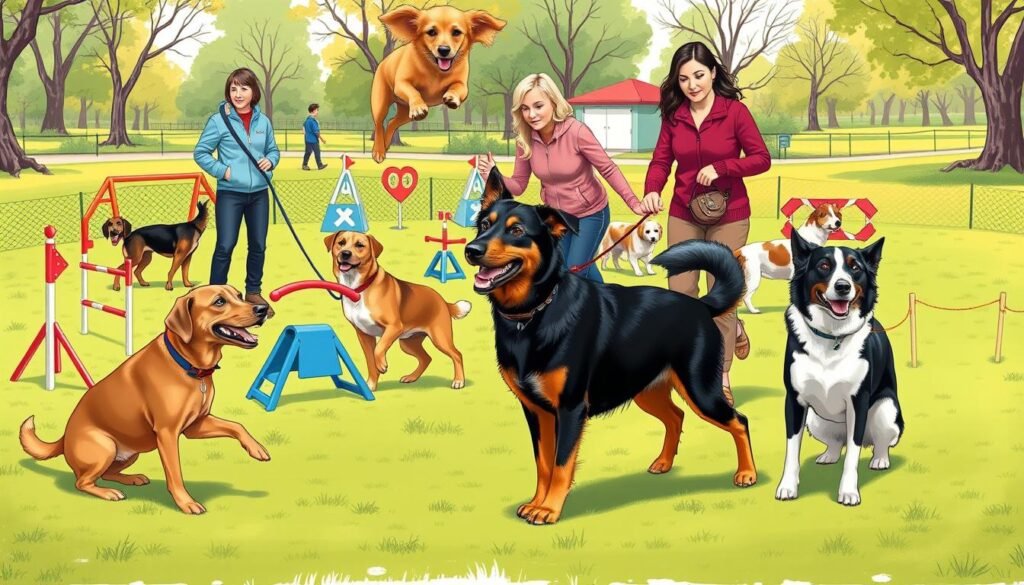Ever thought if the person teaching your dog new tricks is really a pro or just good at marketing? Choosing a dog trainer is key to your dog’s happiness and your own. The right trainer can change your dog’s behavior and your life as a pet owner.
Discover the important steps to pick a trainer who fits your needs. We’ll look at credentials, pricing, and training settings. This guide will help you find the best trainer for your dog.
Get ready to learn about finding a qualified trainer. We’ll cover how to check their skills, teaching methods, and if you’ll get along. You’ll also learn about training costs and finding the right instructor. Let’s make sure your dog is happy and well-behaved!
Quick Recommendation. Our blog is filled with tips and tricks for training your puppy or dog. If you’re seeking a comprehensive online training program, we recommend K9 Training Institute.
Evaluating Trainer Credentials and Experience
Looking for the right dog trainer? It’s key to know about certified dog trainers and accredited dog training professionals. These titles mean the trainer has passed tough tests and follows strict rules. This ensures they’re qualified and trustworthy.

But, professional training experience is also very important. A trainer with lots of experience can handle many different problems. They know how to solve your dog’s specific issues. Ask them about their experience and successes with other dogs.
Also, ask for references or testimonials. Hearing from other pet owners can give you a good idea of a trainer’s skills. It shows if the trainer’s titles match their real-world success. This helps you see if you’ll be happy with their training program.
Assessing Training Methodologies
Choosing the right training methods for your dog is key. Knowing the different techniques helps create a good learning space. Each method targets different parts of a dog’s behavior, so it’s important to match it with your dog’s needs and goals.
Positive reinforcement techniques are very effective. They reward your dog for good behavior with treats, praise, or play. This method builds a strong bond, reduces stress, and boosts learning. It’s great for most dogs.
Some trainers use behavior modification strategies. This method aims to change bad behaviors like aggression or anxiety. It finds the cause and fixes it through consistent, guided interactions.
Every training method has its pros and cons. What works best depends on your dog’s personality and needs. It’s important to think about how each method affects your dog’s feelings and mind.

The success of these training methods relies on being consistent and skilled. If you’re new to dog training, getting help from a pro is a good idea. A customized training plan that includes behavior modification strategies can help your dog learn well. It creates a caring and responsive space for your dog.
Compatibility: Finding a Personality Match for Your Pup
Finding the right trainer for your dog is key to effective training. It’s like finding a mentor who understands you. This connection makes learning fun and effective.

Quick Recommendation. Our blog is filled with tips and tricks for training your puppy or dog. If you’re seeking a comprehensive online training program, we recommend K9 Training Institute.
Think of personalized dog training like a custom-made suit. It fits your dog’s unique personality and needs. A good trainer matches your dog’s vibe, creating a positive learning space.
The right trainer balances respect, patience, and encouragement. This balance is crucial for effective training. Your dog will learn and grow in a supportive environment.
Looking for the perfect trainer might take time. But, it’s worth it for your dog’s happiness and behavior. The right approach leads to better learning and well-being.
Specialization in Breed or Behavior Issues
Finding a specialized trainer can make a big difference in your dog training journey. If your dog has specific breed traits or behavior issues, a specialized trainer can help. They offer solutions that fit your dog’s genetic background and behavior patterns.

Working with a trainer who knows a lot about your dog’s issues can really help. They can tackle problems like aggression, anxiety, or stubbornness. These behaviors need special strategies that general trainers might miss.
When picking a trainer, look for someone who has worked with similar breeds or issues before. They can use their experience to create a plan that works best for your dog. This leads to better management and change in challenging behaviors.
The Significance of Social Proof and Testimonials
When looking for a dog trainer, knowing about social proof is as important as their skills. Past clients’ experiences, shown in testimonials and reviews, offer key insights. They tell you about a trainer’s success and how they work with dogs.
Testimonials are more than just good words. They share stories of how a trainer’s methods change dogs’ behavior. These stories show how well a trainer works with different dogs and problems. They help you know what to expect from their training.
Also, reading reviews on trusted sites can show a trainer’s trustworthiness and success. Look at more than just the ratings. Search for common themes in people’s experiences. This shows if many dogs and owners are happy with the trainer.
This social proof helps you avoid a bad match for your dog. Your dog needs the best training, and using testimonials and reviews helps you find it. This way, you’re making sure your dog gets the best care.
Understanding the Costs: What Should You Expect to Pay?
When you think about dog training costs, several factors come into play. The trainer’s experience is a big one. More experienced trainers might charge more, but they can help your dog learn faster.
The length and type of training also affect the price. Short programs for basic obedience are cheaper. But, longer programs for deeper behavioral changes cost more.
Where you live also changes the cost. Urban areas tend to have higher prices than rural ones. Yet, you can still find affordable trainers in cities who offer great services.
It’s important to weigh the cost against the benefits. A good trainer can save you money in the long run by preventing bad behavior.
To get the best deal, compare prices and services from different trainers. Some offer packages that are more cost-effective than single sessions. Make sure to ask about what each package includes.
Choosing the right trainer is an investment in your dog’s happiness and your own. Good training now means a happier dog and more joy for you in the future.
Facility Visits: What to Look for in a Training Environment
When looking at different dog trainers, visiting dog training spaces is key. Seeing where your dog will learn tells you a lot about the training quality. Here’s what to look for when checking out training facilities.
First, check the cleanliness and organization of the space. A good training area should be tidy and free of distractions. Make sure there are no hazards that could harm your dog.
Next, look at the size and layout of the facility. Dogs need enough room to move and exercise. If the area is too small or disorganized, it might not be right for your dog.
Finally, observe the training tools and equipment. Everything should be in good shape. The quality of the gear shows the facility’s professionalism and the quality of training.
By inspecting training facilities yourself, you get a real look at how things work. This helps you choose the best place for your dog’s training. A comfortable and secure environment will help your dog learn best.
Asking the Right Questions Before Hiring a Trainer
Choosing the right dog trainer is crucial for pet owners. Knowing what to ask a dog trainer before committing is key. Start by interviewing dog trainers with clear questions for potential dog trainers. These should cover their methods and your expectations.
First, ask about their training philosophy. Make sure it matches your views on animal care and discipline. Find out their techniques and why they think they work. It’s vital to know how they measure success and their training schedule.
Then, ask about handling specific behavioral issues. For example, how would they deal with your dog’s fear or aggression? Also, ask for examples of past successes. Real-life examples show how well their training works.
Finally, talk about post-training support. Will they help or offer advice after the sessions end? Knowing this can greatly influence your choice.
With these questions for potential dog trainers, you’re better prepared. You can make a choice that benefits you and your dog.
The Role of Ongoing Support and Aftercare
When your dog finishes their training, the journey doesn’t end. It’s important to keep up with post-training support and aftercare. This helps keep the skills your dog learned sharp. But what does effective dog training follow-up look like, and how can it benefit both you and your furry friend over the long term?
Continuing dog education is not just about fixing bad behaviors. It’s also about making good behaviors even better. This aftercare makes sure your dog remembers what they learned. It also helps them learn new things as they grow and their world changes. So, it’s key to pick a trainer who focuses on follow-up.
Look for trainers who offer ongoing classes or one-on-one sessions. They should have regular check-ins to help with any issues. This support is crucial for making the skills learned in training work in everyday life.
Also, look for trainers who provide resources like training manuals and online tutorials. Having access to advice when needed is also important. These tools help with continuous learning and solving problems after training is over. They make sure you feel confident in guiding your dog’s ongoing development.
In conclusion, finding trainers who focus on dog training follow-up, post-training support, and ongoing education is key. It greatly improves your dog’s long-term training success. Remember, the goal is to build a strong relationship through ongoing education and support. This ensures a happy, well-adjusted pet who brings joy to your life.
Conclusion
Choosing the right dog trainer is a big step. But with the knowledge from this guide, you’re ready to make a smart choice. Look at the trainer’s credentials, experience, and how they train. Also, think about how well your dog will get along with them.
Consider the trainer’s specialty and what others say about them. This will help your dog’s behavior improve.
Knowing the cost of professional dog training is important. Visiting the training facility gives you a real look at where your dog will train. Asking the right questions and understanding ongoing support is key. It makes the training a partnership, not just a service.
Your hard work in choosing a trainer will benefit your relationship with your dog. You’ll have a happy, well-behaved pet. So, choose your dog trainer with confidence. Your decision will lead to many happy moments with your dog.
Quick Recommendation. Our blog is filled with tips and tricks for training your puppy or dog. If you’re seeking a comprehensive online training program, we recommend K9 Training Institute.

